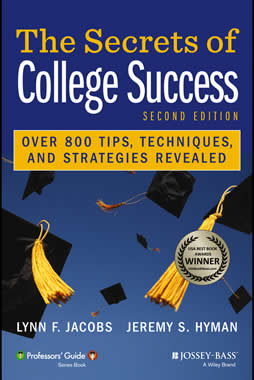Press Release
Contact: Meredith Stanton
mstanton@wiley.com
(415) 782-3242
College is booming these days: 19 million students enrolled, growing at a rate of 4 1/2 percent a year. It's not all that surprising. College is one of the last two middle-class tax breaks (the other being the home mortgage deduction); a generous package of financial aid at many private colleges (indeed, at some schools, no cost for families making less than $60,000 a year) makes college even more appealing. Moreover, the growing realization in the last few years -- the result both of globalization and a tight job market in this country -- that a really good job requires really good training and skills has thrown into high relief the need for a college education and issued in increased emphasis on vocational training (or at least some discernible relation between college courses and career prospects). And if that weren't enough, President Obama just this month put forth a decade-out goal, reminiscent of President Kennedy's moon-landing: "We've also set this goal. America will once again have the highest proportion of college graduates in the world by 2020" (to the Business Council, May 4, 2010).
And yet, only slightly more than half of the students who enroll in US colleges finish a degree within a six-year time frame -- that is to say, at all (US Department of Education survey). More than thirty percent of first-year college students report feeling "overwhelmed a great deal of the time," according to a recent University of California, Los Angeles study (among women, the number approaches forty percent). And, at many large state universities, more than half the entering students have to take remedial courses in math or English composition (sometimes euphemistically called "developmental education"), simply because even 3.0 GPA- high school students haven't acquired college-level analytical or writing skills.
It wouldn't have to be this way.
Professors Lynn F Jacobs and Jeremy S Hyman are on a mission: to teach every college student what professors are expecting of them and to show them how to do it. Their new book Professors' Guide: The Secrets of College Success, to be published July 26th by Wiley Publishing 978-0470874660, is the cornerstone of this effort. "In a way, the book was born when I was a teaching assistant at UCLA," Jeremy remembers. "We led sections for students taking lecture courses with four to five hundred students and felt sorry for them. So we developed handouts with tips: Top 10 Ways to Write a Paper, 7 Strategies for Going to See the Professor, How to Ace the Final in 8 Easy Steps, and so on." "I knew the time was ripe for a book like this," Lynn relates, "when, while teaching at Vanderbilt, I told students that if they weren't sure what the thesis of their paper should be, they should come see me rather than BS their way through. A hundred students lined up. That's when I knew advice for college -- from professors -- was needed."
The book is written in a quick, blog-like style and includes 640 tips for college success. Some cover traditional areas of concern, primarily for incoming and even college-bound students: time-management, study habits, making the leap from high school to college, tips for "college-level" reading, note-taking, and oral presentations. But other tips are geared to more advanced students: picking a major (including whether there's value in picking two or three majors), tips for e-mailing your professor and connecting via Skype, study abroad (when it's desirable and when not), preparing to apply for graduate school, and tips and techniques for landing a job -- all of these are explored in the book. Many of the pieces are presented in modalities in which students -- and professors, parents, advisers, and people generally--- enjoy reading content. Liberal use is made of Top Ten lists, Do's and Don't's tables, Visiting Professor pieces, and (semi-) humorous Fun Facts and Did You Know? tables. And, consistent with Wiley (producers of the "for Dummies" series) tradition, engaging icons are included to help the reader navigate the book -- and have a nice time in the process.
This book represents the only self-help content written completely by college professors (the tips draw on Lynn and Jeremy's over thirty years of experience, teaching at eight different colleges and universities). Chuck Snowden, director of the letters and science honors program at the University of Wisconsin, offered this assessment: "Psychologically sound tips for thriving, not just surviving in college. Following Lynn and Jeremy's tips will make your college experience a spectacular success." J. Steven Reznick, dean of first-year seminars at the University of North Carolina, thought that "it would be impossible to avoid learning something important from this book. The authors have gone to the source and harvested little-known secrets." Eduardo Padron, president of the largest college in the nation, Miami Dade College, thought the book "needs to be required reading for anyone thinking of starting college, regardless of age. It is a great source of very practical advice that could mean the difference between success and failure." And Judy Genshaft, president of the University of South Florida and former president of the American Council on Education, characterized the book as "clear, practical, accurate, comprehensive -- and caring. These authors want you to succeed. They want your college life to be creative and rewarding. They want you to love it. Their caring comes through in every word."
Lynn and Jeremy write a weekly column at US News and World Report and a blog at Reader's Digest's The Lineup. They are always happy to chat with members of the press about the book or about things college, generally. They can be reached at professors@professorguide.com or (479) 444-8862.







